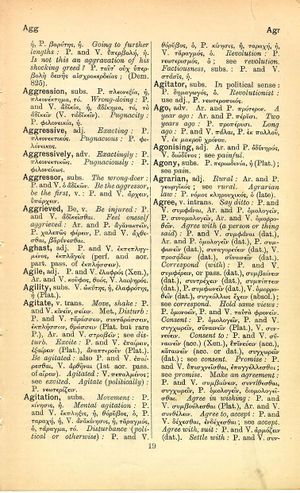agitator
From LSJ
English > Greek (Woodhouse)
subs.
In political sense; P. δημαγωγός, ὁ.
Revolutionist: use adj., P. νεωτεροποιός.
Latin > English (Lewis & Short)
ăgĭtātor: ōris, m. id., pr.
I he that puts a thing in motion; used exclusively of those who drive animals (asses, horses, etc.), a driver (cf. agaso): agitator aselli, poet. for a peasant, Verg. G. 1, 273: equorum Achillis, i. e. the charioteer, id. A. 2, 476: sustineat currum ut bonu' saepe agitator equosque, Lucil. p. 154 Müll.—Hence,
II Esp., a charioteer, a combatant in the games of the circus, Plaut. Men. 1, 2, 50: ego ut agitator callidus, priusquam ad finem veniam, equos sustinebo, Cic. Ac. 2, 20; Suet. Calig. 55; so Inscr. Orell. 2593 sq.: agitatores consopiti sunt, Vulg. Nah. 2, 3.

